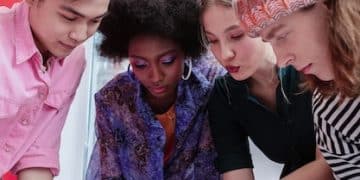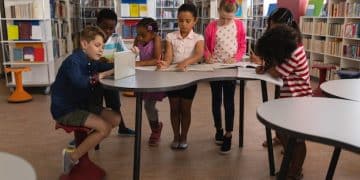The Future of Libraries: Community Arts Hubs Transforming US Local Culture
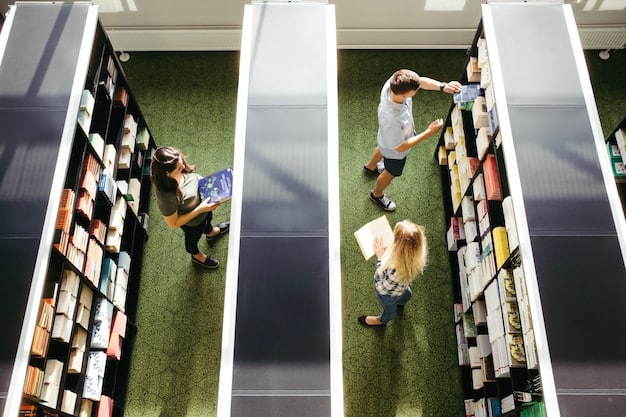
The future of libraries sees them evolving beyond traditional book repositories into vibrant community arts hubs, fostering creativity, learning, and social engagement in the US.
Libraries are no longer just repositories of books; they are transforming into dynamic community spaces. The future of libraries: How they’re evolving into community arts hubs is reshaping local arts and culture across the US, offering a new vision for these vital institutions.
The Evolving Role of Libraries in the 21st Century
Libraries are adapting to meet the changing needs of their communities. This evolution involves embracing technology, fostering creativity, and providing spaces for social interaction.
From Book Repositories to Community Centers
Libraries are expanding their services beyond books to become comprehensive community centers. This shift reflects a broader understanding of what communities need to thrive.
Embracing Technology and Innovation
Technology plays a crucial role in the modern library, providing access to digital resources and innovative tools. Libraries are incorporating technology to enhance learning and engagement.
- Offering free computer classes and internet access.
- Providing access to e-books and online databases.
- Creating digital media labs with equipment for video editing and graphic design.
- Implementing virtual reality experiences for educational purposes.
The shift towards becoming community arts hubs is a natural progression, highlighting libraries’ importance to the cultural fabric.
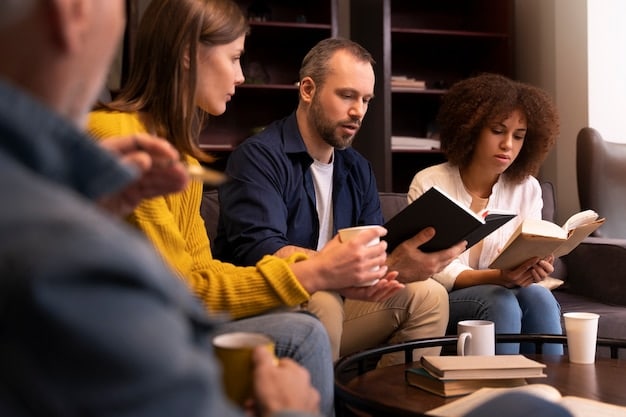
Libraries as Catalysts for Local Arts and Culture
Libraries are becoming key players in promoting local arts and culture, offering resources and spaces for artists and community members to engage in creative activities.
Supporting Local Artists and Creatives
Libraries are providing platforms for local artists to showcase their work and connect with the community. This support fosters artistic expression and cultural exchange.
Hosting Art Exhibitions and Performances
Libraries are transforming into venues for art exhibitions, musical performances, and theatrical productions. These events bring new audiences into libraries and enhance the cultural landscape of the community.
- Organizing monthly art exhibitions featuring local artists.
- Hosting live music performances by local bands and musicians.
- Providing space for community theater groups to stage plays.
- Offering workshops on various art forms, such as painting, drawing, and sculpture.
Libraries are not just places to read; they are evolving into vibrant cultural hubs that enrich the lives of community members.
The Rise of Makerspaces and Creative Labs in Libraries
Makerspaces and creative labs are emerging as popular features in libraries, offering access to tools and technology for hands-on learning and innovation. These spaces empower individuals to bring their creative ideas to life.
Equipping Communities with Tools and Technology
Libraries are investing in equipment such as 3D printers, laser cutters, and sewing machines to create makerspaces that cater to a wide range of interests. These resources democratize access to technology and foster innovation.
Fostering Collaboration and Innovation
Makerspaces provide a collaborative environment where individuals can share knowledge, learn new skills, and work together on creative projects. This collaborative spirit drives innovation and community engagement.
- Offering workshops on 3D printing and design.
- Providing access to software for graphic design and video editing.
- Creating collaborative workspaces for group projects.
- Organizing hackathons and design challenges to encourage innovation.
Makerspaces are transforming libraries into centers of innovation, fostering creativity, and empowering community members to become active creators.
Educational Programs and Workshops for All Ages
Libraries are expanding their educational offerings to include programs and workshops for people of all ages. These initiatives promote lifelong learning and community engagement.
Literacy Programs for Children and Adults
Libraries are committed to promoting literacy by offering programs for children and adults. These initiatives help individuals develop essential reading and writing skills.
STEM Education and Coding Workshops
Libraries are providing STEM (Science, Technology, Engineering, and Mathematics) education through coding workshops, robotics clubs, and science experiments. These programs prepare individuals for future careers in these fields.
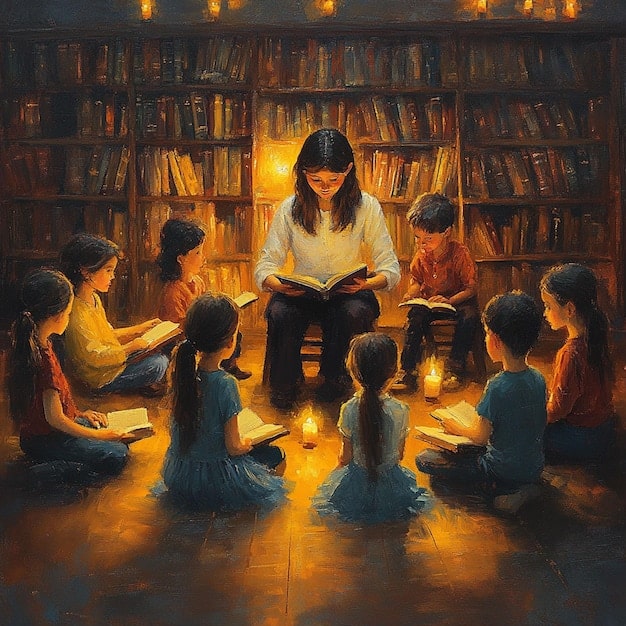
- Offering storytime sessions for preschool children.
- Providing tutoring and homework help for students.
- Organizing book clubs and reading challenges for adults.
- Hosting guest speakers and author talks.
Libraries are becoming centers for lifelong learning, offering programs that cater to the diverse educational needs of their communities.
Community Engagement and Social Inclusion
Libraries are fostering community engagement and social inclusion by providing welcoming spaces and inclusive programs. These initiatives help build stronger, more connected communities.
Creating Welcoming and Inclusive Spaces
Libraries are designing their spaces to be welcoming and inclusive for all members of the community. This includes providing accessible facilities and resources for people with disabilities.
Partnerships with Local Organizations
Libraries are collaborating with local organizations to offer programs and services that address community needs. These partnerships enhance the library’s ability to serve its community effectively.
- Partnering with local food banks to distribute food to those in need.
- Collaborating with community centers to offer health and wellness programs.
- Working with job training organizations to provide career resources.
- Partnering with immigrant support groups to offer language classes.
Libraries are becoming vital social hubs, fostering community engagement and promoting social inclusion.
Funding and Sustainability of Libraries as Arts Hubs
Ensuring the funding and sustainability of libraries as arts hubs requires innovative approaches and community support. Long-term financial stability is critical for libraries to continue providing enriching programs and resources.
Public Funding and Private Donations
Libraries rely on a combination of public funding and private donations to support their operations. Advocacy for increased public funding and fundraising efforts are essential for ensuring the financial sustainability of libraries.
Community Support and Advocacy
Community support and advocacy are crucial for demonstrating the value of libraries to policymakers and donors. Engaging community members in advocating for libraries helps secure their future.
- Organizing community events to showcase library programs.
- Encouraging community members to write letters to policymakers.
- Creating a friends of the library group to support fundraising efforts.
- Hosting workshops to educate the public about the importance of libraries.
Sustaining libraries as arts hubs requires a collective effort from the community, policymakers, and donors.
| Key Point | Brief Description |
|---|---|
| 🎨 Arts Integration | Libraries incorporate arts programs, fostering creativity and community engagement. |
| 👩💻 Tech Access | Libraries provide access to technology, including 3D printers and digital media labs. |
| 📚 Lifelong Learning | Libraries offer programs for all ages, promoting continuous education and skill development. |
| 🤝 Community Hub | Libraries partner with local organizations, enhancing community engagement and social inclusion. |
Frequently Asked Questions
▼
Libraries are adapting by offering e-books, online databases, and digital media labs, ensuring access to information and technology in a rapidly evolving digital landscape.
▼
Makerspaces in libraries provide access to tools like 3D printers and laser cutters, fostering creativity, innovation, and hands-on learning experiences for community members.
▼
Libraries support local artists and culture by hosting art exhibitions, music performances, and offering workshops, creating platforms for artists to showcase their work.
▼
Community engagement is crucial as it helps libraries understand and meet the evolving needs of their communities, ensuring they remain relevant and valued resources.
▼
Libraries can ensure financial sustainability through a combination of public funding, private donations, community advocacy, and partnerships, demonstrating their value to stakeholders.
Conclusion
The evolution of libraries into community arts hubs signifies their enduring relevance in the 21st century. By embracing technology, fostering creativity, and providing inclusive spaces, libraries are transforming into vital centers for education, culture, and community engagement, enriching the lives of individuals and strengthening the social fabric of the US. As libraries continue to adapt and innovate, their role as catalysts for local arts and culture will only become more pronounced. For more insights into the evolving landscape of creativity and community, explore our other articles in the Local Arts & Culture category.



